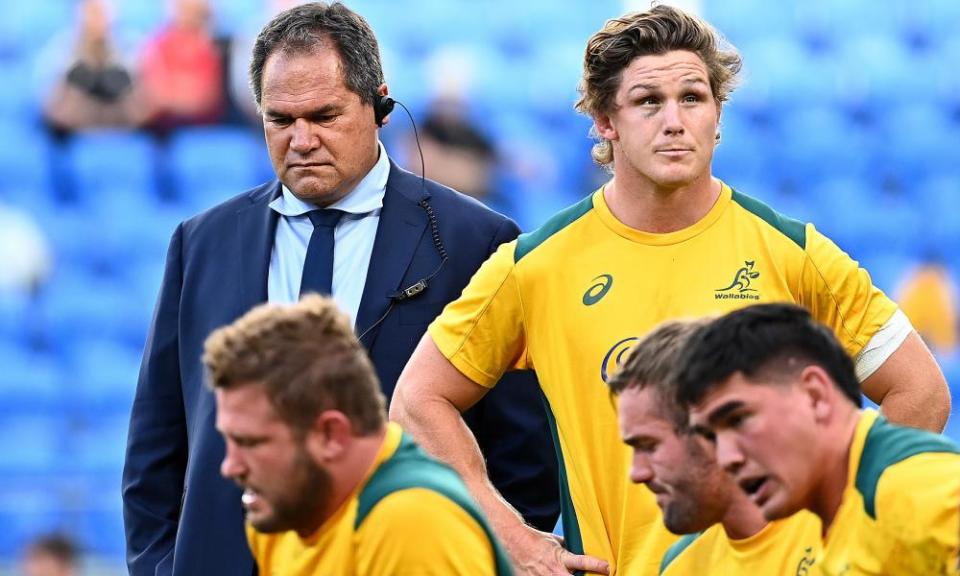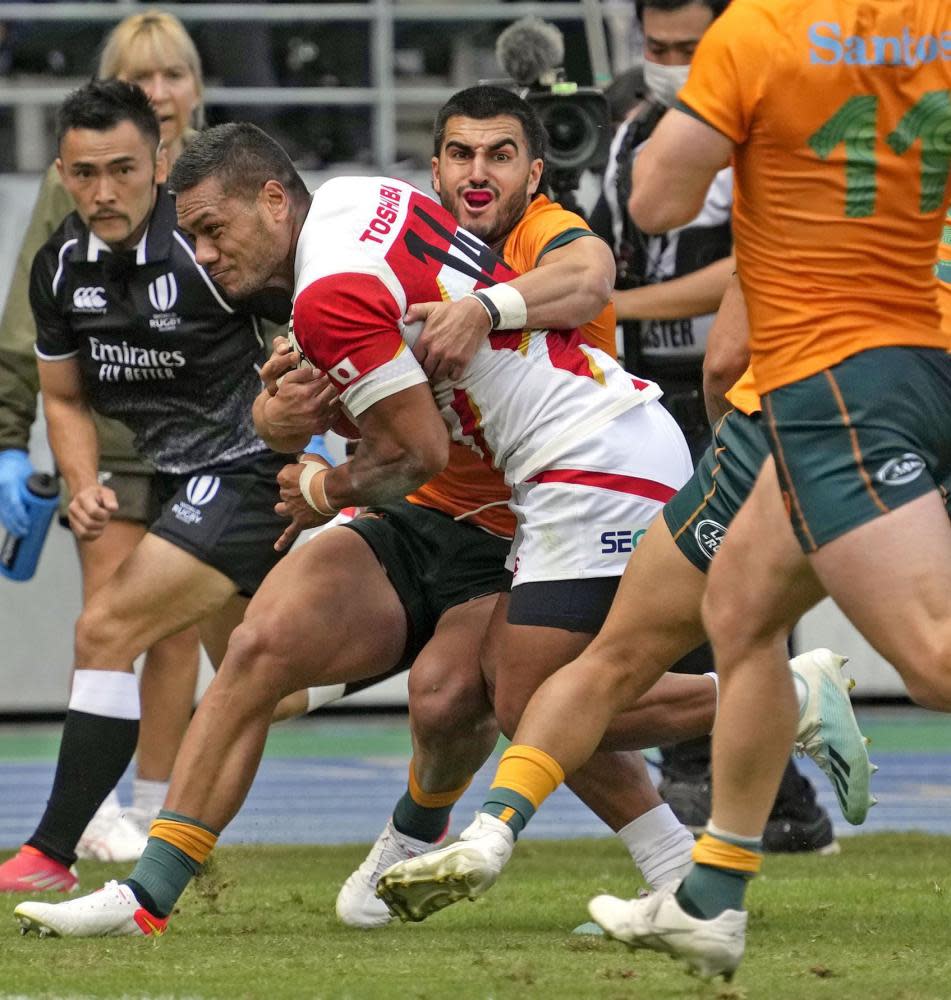Wallabies must rediscover ruthlessness to have a hope in Britain

One of the traits coach Dave Rennie is attempting to instil into the Wallabies is ruthlessness. On that score, the team’s unconvincing 32-23 win against Japan in Oita was deeply disappointing.
Compare Australia’s performance to the All Blacks, who reached triple figures in their 104-14 win against the USA in Washington on Sunday.
To be fair, Japan is a more formidable opposition than the USA, but that is the whole point. The All Blacks put their foot on America’s throat and never took it off. They showed no mercy to a relatively weak opponent.
Related: Wallabies scrape past Japan to make winning start to spring tour
Conversely, the Wallabies never got anywhere near Japan’s throat in the first place – more toothless than ruthless.
Rennie showed Japan respect by selecting the strongest possible Wallabies team, but it looked as if the players thought they were in for an easy win on a stopover to Britain, their main destination. Perhaps that explained why they drifted in and out of the game plan that served them so well in their four straight wins against South Africa and Argentina in the Rugby Championship.
Watch: 10 Minute Core Home Workout Without Equipment | Move At Home
Instead of playing with patience and calmness, the Wallabies at times flicked the switch to vaudeville and the errors which undermined their efforts against the All Blacks in the Bledisloe Cup series crept back into their play.
Wallabies five-eighth Quade Cooper underplayed his game beautifully in the Rugby Championship, but occasionally reverted to showtime against the Japanese. Cooper did produce some wonderful moments, such as when he took the ball to the defensive line and delivered a one-handed pass back inside to winger Tom Wright for the Wallabies’ first try in the sixth minute.
He also played a key role in replacement winger Jordan Petaia’s try in the 21st minute when he threw a bullet pass from left to right to outside back Andrew Kellaway, who put Petaia into space on the right edge.
No one else in the team was capable of throwing that pass except Cooper, but his other attempts at trick passing set the tone for a looseness in the side’s play that was not evident against the Springboks and the Pumas.
It was Cooper trying to push the envelope that led to one of his trademark long passes being intercepted by Japan inside-centre Ryota Nakamura, whose converted try brought the Brave Blossoms to within seven points – 27-20 – with 24 minutes to go. It was a pattern that played throughout the game. The Wallabies would establish a comfortable lead only for Japan to fight their way back.
The Japanese fast line-speed in defence and hard play on the ball at the breakdown seemed to unsettle their opponents.

One thing the game highlighted was that Australia are a different team without powerful inside-centre Samu Kerevi, who was injured. The return of the Japan-based Kerevi to the Wallabies for the first time since the 2019 World Cup sparked the team’s Rugby Championship turnaround.
In his absence, they lacked penetration in the midfield and ran laterally far too often. Apart from crashing across the advantage line, the Japanese low-tackling technique would have suited Kerevi’s off-loading skills.
Still, the Wallabies managed to outscore Japan five tries to two. Some of the tries came from well-executed rehearsed moves such as tight-head prop Taniela Tupou’s score off a five metre lineout, while flanker Rob Leota’s five-pointer was the result of wild and frenetic play while Japan were down to 14 men.
When Cooper was penalised for not releasing the ball in a tackle in the 72nd minute, Japan reduced the deficit to four points with a penalty goal. The Brave Blossoms were going for the win, not a draw, but the Wallabies held on.
A try to replacement hooker Connal McInerney – scoring in his Test debut – off the back of a rolling maul in the 78th minute secured the game for the Wallabies and made the win look more decisive than it actually was.
Watch: 10 Minute Home HIIT Workout | Move At Home
Nevertheless, Rennie’s team will be buoyed by the fact they have won five successive Tests for the first time since 2008 (outside of World Cup years), which will give them confidence as they embark on the British leg of the spring tour.
Apart from regaining their composure, the Wallabies will need to improve in the set-pieces if they are to compete with Scotland, England and Wales.
Once again, their lineout was poor against Japan, something giant France-based lock Rory Arnold may rectify when he joins the squad in the UK.
The Wallabies used their distinct size advantage to dominate the scrum on Saturday, but this superiority declined as both teams went to their benches, a cause for concern against the strong-scrummaging British, particularly England.
If the Wallabies recapture the form they displayed last month, they will certainly be competitive against the British sides, but that may not be enough. To be sure of putting these teams away, they must develop the ruthless streak Rennie is attempting to introduce.

 Yahoo Finance
Yahoo Finance 